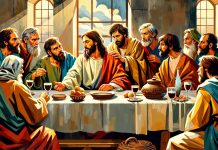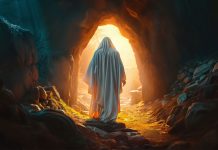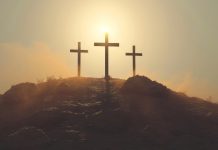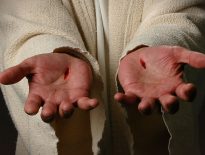“We cry out to the dry bones, ‘Come alive! Come to life!’ / We cry out to the dead hearts: ‘Rise up! Come to life! Let us see an army rise from the ashes'”. The song from which I extracted these verses is so rich in literary devices that, probably, if we randomly chose a person and had them listen to it, they would not understand much of it.
The reason for this is that the song has a very niche, biblical cultural charge. The verses refer to an Old Testament passage in which God gives the prophet Ezekiel a special and shocking vision.
A macabre valley, full of mixed human bones which seemed to have been there for a long time, lay before his eyes. Ezekiel walks among them, amazed at the amount, and God asks him, “Son of man, can these bones live?” “Sovereign Lord, you alone know,” Ezekiel answers.
Here is the wisdom and confidence of the prophet, who recognises that, humanly speaking, it is impossible for these disparate skeletons to become living beings again. Ezekiel’s answer, however, includes the implicit acknowledgement that God has the ability to do something as frightening as bringing the dead back to life. Wisdom lies in the fact that his answer also includes the realisation that, although He has this ability, God may not want to perform such a miracle.
However, it was not for nothing that he was shown those things. God was about to involve the prophet in an extraordinary manifestation of divine power. He commands Ezekiel to prophesy to the bones that they will be resurrected. Ezekiel does exactly as he is told and a terrifying roar, followed by an earthquake, causes the bones to recompose. “I looked,” Ezekiel says, “and tendons and flesh appeared on them and skin covered them.” An amazingly cinematic description, if we consider that, according to his own statement, the book must have been written almost 600 years before Christ.
However, the bodies were not enough for the resurrection. So, God told Ezekiel to “prophesy to the breath” and to tell him that “This is what the Sovereign Lord says: ‘Come, breath, from the four winds and breathe into these slain, that they may live’”. Ezekiel does just that, and without understanding what is going on around him, he sees how “they came to life and stood up on their feet—a vast army.”
God explains to the prophet what he has witnessed: ‘Then he said to me: ‘Son of man, these bones are the people of Israel. They say, ‘Our bones are dried up and our hope is gone; we are cut off.’ Therefore prophesy and say to them: ‘This is what the Sovereign Lord says: My people, I am going to open your graves and bring you up from them; I will bring you back to the land of Israel.'”
“Then you, my people, will know that I am the Lord, when I open your graves and bring you up from them. I will put my Spirit in you and you will live, and I will settle you in your own land. Then you will know that I the Lord have spoken, and I have done it, declares the Lord.”
This passage, of unnaturally beautifully twinned poetry with clarity, is found in chapter 37 of the book of Ezekiel. However, his message transcends the boundaries of the book and spills over into the pages of the entire Bible. It is the essence of the gospel, the good news of Christianity, from the beginning of time.
The lie
When he showed the first people how many fascinating things they could do with their lives, God told them not to eat of the fruit from the “tree of the knowledge of good and evil,” lest they “die”. But the temptation was whispered in Eve’s ear: “You will not certainly die,” and her bite into the fruit, then Adam’s bite, was the beginning of mankind’s suffering.
Probably anyone who reads this story in the book of Genesis observes that on the day they ate from the tree of the knowledge of good and evil, Adam and Eve did not die, but, conversely, they had feelings they had never experienced before: shame of one another and God; lack of control, which they tried to compensate by using various strategies: hiding, dressing themselves up in leaves, looking for culprits; overwhelming regret, when God appealed to their still-alive sincerity, through simple questions aimed at making the anamnesis of the fall into sin.
Interestingly, the first case study in the history of human psychology was one on anxiety: Adam and Eve were frightened by the unknown standing in front of them, aware that by eating the fruit, they had violated their understanding with the Creator.
We can only imagine how desolate Eve must have been, realising that the magical experience she had been waiting to experience after eating from the tree was, in fact, an unprecedented collapse of her soul, in the utter senselessness of what she had done.
Or how shocked Adam must have been by the new coordinates of his life, radically transformed into evil by the eating of a simple fruit, but invested with the symbolic significance of their disobedience to God’s command. But perhaps they had never felt more alive before: that is, they had not become aware of the huge responsibility of being, of making decisions, of bearing consequences.
They did not die the second they took the first bite; the snake was right. However, seeing how the Paradise where you were born is hidden behind closed gates which you can no longer enter and how everything around you lives and then degrades, finding out that your first child killed the second and that he is as wild as the beasts of the field, knowing that your time will soon come too… this is pure agony. So, the snake had lied.
Stillborn
Much worse than dying instantly poisoned by the forbidden fruit is dying tortured moment by moment, with your soul rotting inside you, and having to live like this until you die. And, moreover, knowing that the only thing you can pass on to your children is but this spiritual mould, which will clothe them all, more and more, until, in the end, there will be no difference between your sons and the angels who were cast out of heaven because of the rebellion in the beginning. To live in terror is, in fact, to be the living dead.
However, God did not abandon His creation in the existential chaos into which it voluntarily stepped. Because His creative intent was for man not to know evil, He shaped the human soul according to coordinates incompatible with death—not in the sense that the soul is immortal, but in the sense that everything in the human soul revolts against the idea of death.
The thought that we are dying, that our loved ones will die, awakens a mixture of repulsion, regret, and fear in spite of our attempts to educate ourselves to see death as a natural end of all life.
From an evolutionary perspective, death is beneficial to the evolution of life: the weak die, the strong take their place and prosper. That’s the way it should be. From a Christian point of view, however, death is an aberration. It is an unintentional infection, incompatible with other basic components of life—with communion, love, happiness and, above all, with the proverbial longing for the everlasting. Christianity empathises with the soul’s revolt against death and gives it hope that death is not the last stop.
When Adam, as a representative of the human family, learned from God Himself what the consequences of human sin were, he also learned that there was a way to heal all the evil that had been done. However, this would not be an easy path, although God promised to lead him step by step on the way, while respecting the full freedom he had been given at the birth of mankind.
On this common path, humans would suffer everything, and God would sacrifice everything. No one could profit from this. However, this road was inevitable and absolutely necessary for God and humans to rebuild what had been torn apart by betrayal: trust. This is how the history of human suffering was written, in physical and spiritual agony. But God kept His word and suffered with mankind.
Promise kept
At Easter, we commemorate the fact that God has kept His promise and that He has not withheld any effort to save mankind, but has given His dearest Son so that salvation may be possible. This is the essence of the gospel and the good news to the human who realises with fear and regret that he was stillborn compared to the ideal world—the Paradise God intended—and that he can only get there if he is resurrected.
But how can something dead be resurrected? How can a human with a sinful nature accomplish something truly good, untainted by selfish intentions or interests? This is a question that echoes in the Bible: “Can an Ethiopian change his skin or a leopard its spots? Neither can you do good who are accustomed to doing evil”. Rationally, the answer should be “no”. After all, a dead person cannot rise and something good cannot come out of something bad. Nevertheless, God’s reality sometimes contradicts reason.
Ezekiel, a man chosen by God to understand how God works, witnessed the impossible: he saw a sea of bones becoming a great army. Thus, he understood that God can and wants to enter the cemeteries of our dead hopes and call them back to life. The death and resurrection of His Son is the supreme revelation of this reality. God has given His own life as a guarantee (Jesus is God) as proof that He wants and is able to resurrect us.
The apostle Paul puts a lot of emphasis on this subject, because it is a matter of life and death—both literally and figuratively. He told the Christians in Rome something that remains valid for all Christians today: “the whole creation has been groaning as in the pains of childbirth right up to the present time. Not only so, but we ourselves, (…) groan inwardly as we wait (…) the redemption (…)”.
Yes, humanity suffers and no one is exempt. Not even Christians, only they are comforted by trusting in God’s promise that He loves them and will heal and redeem them.
“For in this hope we were saved,” says Paul. “And if the Spirit of him who raised Jesus from the dead is living in you, he who raised Christ from the dead will also give life to your mortal bodies because of his Spirit who lives in you.”
It is hard for reason to believe this, because it has never seen a man rise again. But hope can believe. Why? Because, by definition, hope is that perseverance in trust that is not based on evidence. Paul also says, “…hope that is seen is no hope at all. Who hopes for what they already have?” What is seen is proven, not hoped for. Hope means “not seeing, yet believing”.
None of us saw what Ezekiel saw. None of us have seen Christ rise from the dead and the empty tomb. But this gives us hope. If we had seen everything, we would have been the only ones to certify the status quo. But because we have not seen, our Christianity means the ability to hope, to have confidence. It is the ideal to which our religion pushes us: to become beings who, although when they saw they did not believe (Adam, in Paradise), end up hoping, believing, and loving God as humans have never loved Him, even when they do not see (us, today). This is the miracle that God does through the Resurrection.
Alina Kartman (36 years old) graduated from the Faculty of Communication and Public Relations at the National School of Political and Administrative Studies in Bucharest (SNSPA), but chose a career in journalism. With hundreds of published analysis materials, she has accumulated over 13 years of editorial experience.



















